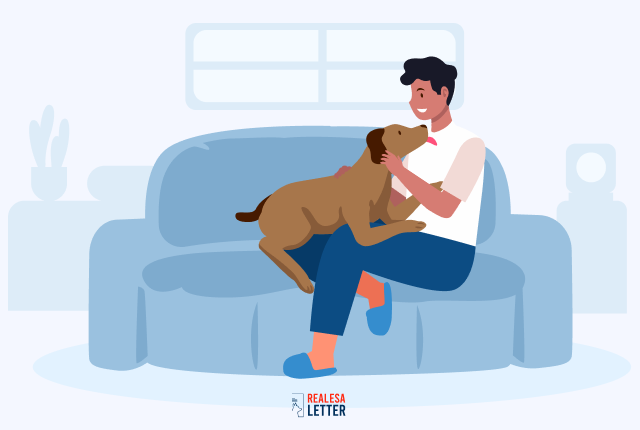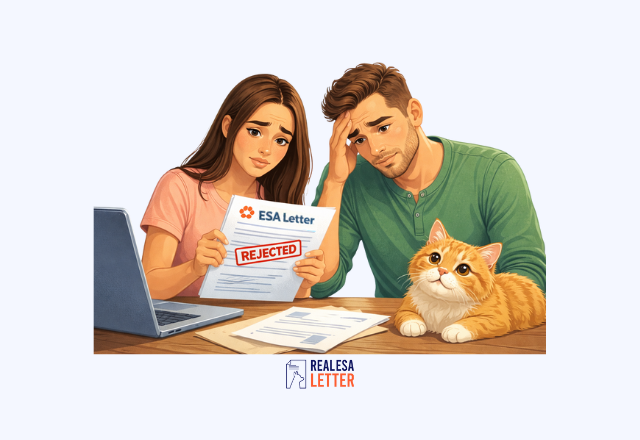You finally found the perfect rental property, but the landlord says your companion can’t stay. That heartbreaking news can rapidly turn into stress, disrupted treatment, and even housing instability.
Below, we’ll break down when landlords can (and can’t) say no, what documentation works, and the exact steps to take if your ESA request is denied.
Cases Where a Landlord Can Legally Reject an ESA
Most housing providers must grant reasonable accommodations for assistance animals, including ESAs. But the Fair Housing Act (FHA) allows limited, fact-specific denials. Think of these as exceptions that must be supported by objective evidence, not just intuition.
Unauthorized ESA Letter
If your “documentation” is a generic ESA registration or certificate purchased online, it is not considered legitimate. Without a real therapeutic relationship or a licensed professional involved, the landlord can question its reliability.
HUD states that documentation should come from a healthcare professional who has personal knowledge of your disability-related need. Telehealth is fine when there’s a genuine provider–patient relationship.
University housing offices are particularly vigilant about unauthorized letters. UCLA rejected multiple ESA letters last year after discovering that students had used services that lacked a legitimate provider-patient relationship.
Direct Threat or Health Risks
Providers may deny if the specific animal (not the species or breed) poses a direct threat to others’ health or safety that can’t be reduced by reasonable steps (e.g., training, leashing). This must be an individualized assessment grounded in verified information, not speculation.
Significant Property Damage
If the animal has caused, or is likely to cause, substantial damage to the property and the risk can’t be mitigated, the request can be refused.
Apart from denial, landlords can charge you for actual damage if they penalize all tenants for damage. However, they cannot impose a pet deposit or pet rent for ESAs.
Noise Disturbances
Persistent, documented noise that significantly interferes with others' routine and enjoyment, even after you've had the chance to correct it, can support denial or lease enforcement. The key is evidence-based, individualized assessment, not stereotypes about certain breeds or animal types.
Landlords must provide specific documentation of noise complaints, including dates, times, and witness statements from multiple neighbors. A single isolated incident is not enough to justify denial or removal.
The landlord must give you a reasonable opportunity to address the problem before taking action against your ESA. This might include working with a trainer, adjusting your schedule, or implementing noise-reduction strategies.
If you share your living space with roommates, addressing noise concerns proactively becomes even more important. Creating an ESA roommate agreement that includes noise management strategies and house rules can help prevent conflicts before they escalate to landlord complaints.
Only when documented disturbances continue despite your good-faith efforts to resolve them can the landlord pursue removal or deny your accommodation request based on noise concerns.
Undue Financial Burden
If accommodating the animal would impose an undue financial and administrative burden on the housing provider and no reasonable alternative exists, denial may be justified. However, landlords must prove that the burden is truly excessive relative to their resources and operations.
Normal costs associated with reasonable accommodations, such as slightly increased maintenance or minor policy adjustments, do not qualify as undue burdens. Housing providers should engage in the interactive process to explore cost-effective alternatives before claiming financial hardship.
Small landlords with limited resources may have stronger undue burden claims than large property management companies with substantial budgets. The assessment must be individualized, considering the provider's size, resources, and the specific accommodation's actual cost, not hypothetical or exaggerated expenses.
Fundamental Alteration
If allowing the ESA would fundamentally alter the landlord's operations, such as requiring a wholesale change to residential services or business model, the landlord can deny the request. This exception is narrow and applies only when accommodation would transform the essential nature of the housing provider's operations.
For example, a landlord cannot be forced to provide animal care services, veterinary assistance, or on-site pet supervision. However, simply allowing an ESA to live in a unit does not constitute a fundamental alteration, even in no-pet buildings.
The landlord must demonstrate that the accommodation changes the core function of their housing services, not just creates a minor inconvenience. Claims of fundamental alteration require substantial proof and are rarely successful, as most ESA accommodations require only passive acceptance rather than active service changes.
Expired ESA Letter
If your ESA letter is outdated, a landlord can reject it because it no longer proves your current need for accommodation. Most housing providers require documentation that is valid within the past 12 months and signed by a licensed mental health professional.
An expired ESA letter signals that your disability-related need hasn’t been recently verified. To avoid denials, make sure you renew ESA letter annually and keep your documentation up to date.
Exemptions from the Fair Housing Act (FHA)
Some housing isn't covered by FHA protections, including owner-occupied buildings with four or fewer units and certain single-family homes rented without a broker. In these exempt situations, landlords are not required to accommodate your ESA.
NYC co-op buildings, however, are covered under FHA and must consider ESA requests. That said, co-ops operate under unique governance structures, including shareholder votes and board approvals, that can complicate the accommodation process. Understanding how to navigate NYC co-op ESA requirements is essential for a successful approval.
Animal Size, Breed, & Behavior
Breed or size limits can’t be used to deny an ESA solely on policy grounds. However, a provider may refuse a particular animal whose behavior poses an undeniable direct threat or a significant risk of damage.
Illogical Accommodation Requests
A request can be denied when there's no logical connection between the disability and the assistance the animal provides.
For instance, if the documentation doesn't specify a mental or emotional condition or explain how the animal helps manage symptoms, the landlord can reject it. Your ESA letter must clearly establish that you have a qualifying disability and that the animal alleviates specific symptoms related to that condition.
Generic letters that simply state "this person has an ESA" without explaining the therapeutic relationship fail to meet legal requirements. Landlords are allowed to question vague or incomplete documentation that doesn't demonstrate a legitimate disability-related need.
The connection between your condition and the animal's support must be medically reasonable and clearly articulated. Without this essential link, your accommodation request lacks the legal foundation required under fair housing law.
Apartment Size Constraints
"Too big for the unit" isn't, by itself, a lawful reason for denial. But if accommodating a very large specific animal would create an undue burden, such as serious structural concerns, and no reasonable alternative exists, denial may be permissible after an interactive dialogue.
Landlords must evaluate whether the animal can reasonably fit in the living space without causing safety hazards or property damage. A studio apartment might genuinely be too small for a very large dog if it creates fire code violations or blocks emergency exits. However, the landlord cannot use size as a blanket excuse without conducting an individualized assessment of your specific situation.
They must engage in a good-faith discussion to explore possible solutions before denying based on space limitations. Only when accommodation would fundamentally alter the housing structure or pose genuine safety risks can size become a valid denial factor.
State Laws Prohibit Ownership of the Animal
Where possession of a particular species is illegal under state or local law, a housing provider generally isn’t required to grant an accommodation that would violate the law.
Always check local requirements in addition to federal fair housing standards. A general legal principle would be to pair with HUD’s overall framework on undue burden/fundamental alteration.
Breach of Lease Agreement
Tenants remain responsible for feeding, maintaining, providing veterinary care, and controlling the emotional support animal at all times. While ESAs are protected under the Fair Housing Act, you must still comply with reasonable lease terms and housing rules.
Repeated failure to meet basic conduct standards can justify lease enforcement or even ESA denial. This includes failing to clean up after your animal, allowing excessive noise disturbances, neglecting veterinary care, or letting your ESA roam uncontrolled in common areas.
Landlords can document these violations and take action if problems persist. If your animal causes sanitation issues, damages property beyond normal wear, or repeatedly disturbs neighbors despite warnings, the landlord may remove the animal or pursue lease termination.
ESA protections do not excuse irresponsible ownership. You must demonstrate that you can care for your animal appropriately and follow reasonable housing standards to maintain your accommodation rights.
Cases Where a Landlord Can’t Legally Reject an ESA
Even strict “no pets” buildings must consider assistance animals differently. Under federal law, ESAs are not pets; they are part of reasonable accommodation rights.
The Department of Housing and Urban Development (HUD) makes clear that legal protections for emotional support animals apply when the need is documented, and no exception (threat, undue burden, etc.) applies.
No Pet Policy
A blanket "no pets" rule cannot be used to refuse a properly supported ESA accommodation. Under the Fair Housing Act, ESAs are not classified as pets. They are assistance animals that provide therapeutic support for individuals with mental or emotional disabilities.
It's important to note that in New York City, tenants may also have protections under the 90-Day Pet Law for standard pets, which operates separately from ESA rights and applies to buildings with three or more units.
This legal distinction means that standard pet policies, including breed restrictions, weight limits, and pet bans, do not apply to emotional support animals. Landlords must make reasonable accommodations even in buildings with strict no-pet rules.
However, this protection only applies when you provide valid documentation from a licensed mental health professional. Your ESA letter must clearly establish your disability-related need for the animal. Without proper documentation, landlords can legally enforce their pet policies.
Legitimate ESA Letter
When you provide reliable documentation from someone who can write an ESA letter, such as a licensed mental health professional who understands your condition, your landlord must consider it fairly. Landlords cannot deny a valid ESA letter based on personal preferences or skepticism alone.
However, a fake ESA letter can be rejected immediately because housing providers are allowed to verify legitimacy and deny any document that fails legal requirements.
Personal Bias or Choices
Disliking animals, fears, or generalized concerns don't count as valid reasons for denial. Housing decisions must be individualized and evidence-based, not rooted in personal bias. A landlord cannot refuse your ESA simply because they don't like dogs, had a bad experience with animals in the past, or personally believe ESAs are unnecessary.
The Fair Housing Act requires an objective evaluation of each request. Landlords must assess whether your specific animal poses a direct threat or causes undue burden based on factual evidence, not assumptions or preferences.
Personal opinions about emotional support animals, skepticism about mental health conditions, or general discomfort around animals are not legally acceptable grounds for denial. The law protects against discrimination based on disability and ensures decisions are made fairly.
Speculations on Animal Behavior
Guessing that an animal "might" bite or "could" bark is not enough to justify denial. Landlords need reliable, objective evidence tied to the specific animal; otherwise, they can't reject it legally.
Hypothetical concerns or assumptions about what an animal might do in the future are not valid grounds for denial. The Fair Housing Act requires landlords to evaluate actual behavior, not speculate about potential problems.
If your animal has no history of aggression, hasn't caused property damage, and hasn't disturbed neighbors, the landlord cannot deny based on fears alone. However, if your ESA has documented incidents of biting, repeated disturbances, or property destruction, the landlord may have valid grounds for denial. The key difference is evidence versus speculation.
Assumptions on the Size of the Animal
Weight limits or breed charts don't apply to ESAs under fair housing law. The evaluation centers on the particular animal's conduct and whether any risk can be mitigated, not arbitrary size restrictions. Landlords cannot deny your ESA simply because it exceeds a weight limit or belongs to a restricted breed.
The law prohibits blanket policies that categorically exclude animals based on size or breed alone. Instead, landlords must assess whether your specific animal poses a direct threat to health or safety or would cause substantial property damage.
Even large dogs or breeds commonly restricted in pet policies are protected if they are well-behaved and necessary for your disability. The focus must remain on the individual animal's actual behavior and your demonstrated need.
Reasonable Accommodation Requests Under the ESA Laws
Under emotional support animal laws enforced through the FHA (and, where applicable, Section 504/ADA in certain public or government-run housing contexts), tenants may request leniency in rules that are necessary to use and enjoy their home.
Common, lawful requests include:
- Permission to keep the ESA despite a “no pets” policy.
- Waiver of pet deposit/pet rent and other pet fees (while still paying for actual damages if they occur).
- Exceptions to breed/weight limits or number restrictions, if supported by need.
- Access to common areas and reasonable timelines for decisions (HUD suggests providers act promptly).
Can a Landlord Deny An ESA Letter?
Yes, sometimes, but only in narrow, documented circumstances. A landlord may deny an ESA letter if the documentation isn’t reliable. For example, a “registration” with no clinician relationship, or a letter that fails to establish disability and need.
A strong ESA letter should include:
- the provider’s license and contact info,
- confirmation of a disability (without revealing diagnoses),
- a clear statement that the animal alleviates one or more symptoms/effects,
- and identification of the animal (type), all from a clinician who has personal knowledge of your condition.
What to do if Your ESA Request is Denied Unfairly
If you believe the denial doesn’t fit the lawful exceptions, take these steps:
Step #1: Pursue Mediation
Ask for an interactive meeting. Offer solutions (such as training, leash use, and waste management plans) that address concerns without undermining your accommodations.
Step #2: Register a Complaint
You can file a discrimination complaint with HUD’s Office of Fair Housing and Equal Opportunity (FHEO). You generally must file within one year of the last discriminatory act.
Step #3: Ensure Proper Documentation
Update your ESA letter with your licensed mental health professional, making sure it clearly ties your disability to the ESA’s support and reflects a real provider–patient relationship. Keeping your documentation valid also ensures your ESA letter can save your money by helping you avoid unnecessary pet fees or housing charges.
Step #4: Reach Out for Legal Help
You may also bring a private lawsuit under the FHA, typically within two years (administrative filings can affect timing). An attorney or local fair housing group can advise on strategy.
Step #5: Don’t Wait, Act Timely
Document all communications and deadlines. HUD investigations are designed to move quickly, and timely action preserves your options for legal action.
ESA Tenant Rights: What Every Renter Should Know
Emotional Support Animal (ESA) tenants have specific legal protections that allow them to live with their ESA, even in housing that normally restricts pets. These protections come from the Fair Housing Act (FHA), a federal law that requires landlords to make reasonable accommodations for people with disabilities.
ESA tenant rights ensure that individuals who rely on emotional support animals are not denied housing opportunities simply because they need an animal for emotional or mental well-being.
Below is a complete breakdown of your ESA tenant rights in simple words.
1. Right to Live With Your ESA, Even in No-Pet Housing
Landlords must allow your ESA in housing that normally bans pets.
A “no-pets” policy cannot be used against you when you present a valid ESA letter.
This protection exists because an ESA is not considered a pet; it is a disability-related accommodation.
2. Right to an Exception From Pet Fees
Landlords cannot charge:
- Pet rent
- Pet deposits
- Pet application fees
- One-time pet fees
Since your ESA is legally not a pet, any pet-related fee is illegal.
3. Right to Reasonable Accommodation
You have the right to request reasonable changes in policy so you can live with your ESA. A landlord must review your request fairly and cannot delay or ignore it.
Reasonable accommodation includes:
- Allowing the ESA in the unit
- Allowing the ESA in common areas
- Adjusting pet restrictions
Your landlord must process your request in a timely and respectful manner.
4. Right to Privacy
A landlord cannot require:
- Your diagnosis
- Your medical history
- Your treatment plan
- Details about your symptoms
They can only request a valid ESA letter that confirms your need for emotional support.
5. Right to Be Free From Discrimination
Landlords cannot:
- Reject you because you have an ESA
- Treat you differently from other tenants
- Force you to move to a specific unit
- Limit where your ESA is allowed inside the building
You deserve equal access to housing, without penalties for needing an ESA.
6. Right to Be Evaluated Fairly
A landlord must consider your request based on facts, not assumptions.
They cannot deny your ESA because:
- They dislike animals
- Other tenants complain
- They have insurance concerns
- Your ESA is a certain breed or size
Breed, weight, and size restrictions do not apply to ESAs.
7. Right to Challenge an Illegal Denial
If a landlord denies your request for reasons not allowed under the FHA, you have the right to challenge it.
You may:
- Ask for a written explanation
- Correct missing documentation
- Provide a new updated ESA letter
- File a fair housing complaint
- Seek legal help if needed
Fair housing agencies often resolve cases quickly once a tenant files a report.
8. Right to Keep Your ESA as Long as You Follow Reasonable Rules
Your landlord cannot remove your ESA unless:
- It causes major property damage
- It poses a confirmed safety threat
- You refuse to follow building rules
- Your documentation is invalid or outdated
As long as your ESA behaves responsibly, your landlord must allow it.
ESA tenant rights make sure you are not denied a safe and stable home because you rely on an emotional support animal. With a valid ESA letter and proper behavior, your landlord must honor your right to live with your ESA even in strict, no-pet housing.
Don’t Get Disappointed by Landlord Denials: Protect Your ESA Rights Today!
Landlords cannot deny legitimate ESA accommodations based solely on a “no-pets” policy, breed/size rules, or personal discomfort.
Denials are allowed only when the specific animal presents a verified threat to health or safety, would cause significant damage that can’t be mitigated, or when an accommodation creates an undue burden or fundamental alteration.
Knowing your rights and bringing the right documentation keeps you squarely within the legal protections for emotional support animals under federal law.
If you’re ready to move forward with confidence, consider trying RealESALetter.com to obtain a compliant ESA letter from a qualified clinician the right way. Bring calm and your loved companion home with ease!
Pricing
PSD Letter
Reviews
ESA By States
ESA Laws
Resources









